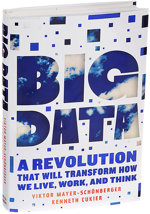Big Data: A Revolution That Will Transform How We Live, Work and Think
Viktor Mayer–Schönberger
Tuesday, 11 Nov 2014 at 8:00 pm – Great Hall, Memorial Union
Viktor Mayer-Schönberger, a visionary thinker and entrepreneur, is coauthor of Big Data: A Revolution That Will Transform How We Live, Work and Think. Best known for his ground-breaking research into the role of information in the networked economy, Mayer-Schönberger is a professor of Internet Governance and Regulation at Oxford University's Internet Institute and author of eight books, including Delete: The Virtue of Forgetting in the Digital Age. Founder of the data security company Ikarus Software in his native Austria, he advises governments, businesses and NGOs on information innovation. He is also affiliated with the Belfer Center of Science and International Affairs at Harvard University, and the author of over a hundred articles and book chapters on the governance of information. National Affairs Series on Innovation KeynoteAdditional bio:
After successes in the International Physics Olympics and the Austrian Young Programmers Contest, Dr.Mayer-Schönberger studied law in Salzburg (Mag.iur, '88, Dr.iur '91), Cambridge (UK) and Harvard (LL.M. '89). In 1992 he received a M.Sc. (Econ) from the London School of Economics. In 1986 he founded Ikarus Software, a company focusing on data security and developed the Virus Utilities, which became the best-selling Austrian software product, and has received numerous awards for innovation and entrepreneurship.He has chaired the Rueschlikon Conference on Information Policy in the New Economy, bringing together leading strategists and decision-makers of the new economy. He is the cofounder of the SubTech conference and from 2003-2006 served on the ABA/AALS National Conference of Lawyers and Scientists. He is a frequent public speaker, and sought expert for print and broadcast media worldwide. He is on the boards of foundations, think tanks and organizations focused on studying the foundations of the information economy, and advises governments, businesses and NGOs on new economy and information society issues.
Part of the Wonder of Words Festival
Co-produced by the Des Moines Public Library and the Downtown Community Alliance, the Wonder of Words Festival is a compilation of several events, taking place at various venues in Downtown Des Moines and surrounding communities. The Wonder of Words Festival connects readers, writers, and publishers at events that celebrate reading and share the joy of lifelong learning. Sponsors include Alliant Energy, BRAVO Greater Des Moines, Casey�s General Stores, Des Moines Public Library Foundation, DMACC, MidAmerican Energy Company, Prairie Meadows, Principal Financial Group, and Meredith Corporation. wonderofwordsfest.com
Cosponsored By:
- Agronomy
- Animal Science
- Baker Ctr Bioinformatics and Biological Statistics
- Chemistry
- College of Agriculture & Life Sciences
- College of Business
- College of Engineering
- College of Human Sciences
- College of Liberal Arts & Sciences
- Computer Science
- Economics
- Information Technology Services
- Mathematics
- National Affairs
- Plant Sciences Institute
- Sociology
- Statistics
- Wonder of Words Festival
- Committee on Lectures (funded by Student Government)
Stay for the entire event, including the brief question-and-answer session that follows the formal presentation. Most events run 75 minutes.
Sign-ins are after the event concludes. For lectures in the Memorial Union, go to the information desk in the Main Lounge. In other academic buildings, look for signage outside the auditorium.
Lecture Etiquette
- Stay for the entire lecture and the brief audience Q&A. If a student needs to leave early, he or she should sit near the back and exit discreetly.
- Do not bring food or uncovered drinks into the lecture.
- Check with Lectures staff before taking photographs or recording any portion of the event. There are often restrictions. Cell phones, tablets and laptops may be used to take notes or for class assignments.
- Keep questions or comments brief and concise to allow as many as possible.





